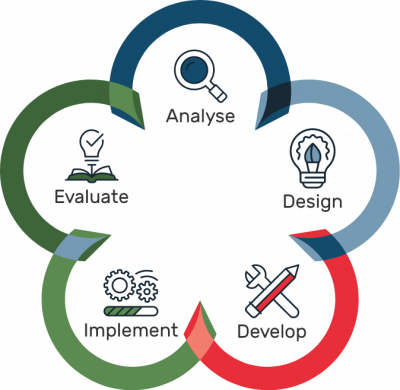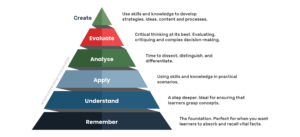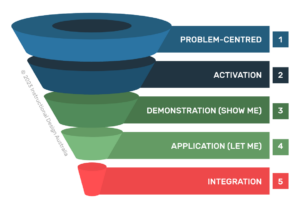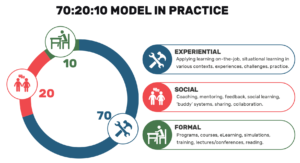10 Engaging Learning Activities to Enhance Retention in Adult Education
FREE download
Complete the form to download a quick reference guide (QRG) for 10 engaging learning activities to enhance retention.
Engaging adult learners in education can be challenging. But adding retention-boosting exercises can really make a difference. In this post, we’ll look at 10 interesting learning exercises that might improve adult learners’ retention.
- Mind maps: Mind mapping is a useful tool for teaching learners how to link and organise knowledge. It is a visual tool that aids in memory retention and helps learners grasp complicated subjects. Making a mind map allows learners to identify how many ideas are related to one another, which helps increase learning and improve recall.
- Group projects: Projects in collaboration provide learners the chance to come up with solutions to issues, exchange ideas, and learn from one another. Working in groups allows learners to remember knowledge better and develop a deeper comprehension of the subject matter. Collaboration and collaboration are two crucial interpersonal skills that learners may acquire through collaborative projects.
- Problem-solving activities: Problem-solving activities force learners to exercise critical thought and put their knowledge to use in practical settings. These exercises can improve retention and strengthen learners’ grasp of the subject matter. Individual or group problem-solving exercises can be employed in a number of educational environments.
- Case studies: Case studies provide learners real-world examples to consider and debate. By studying case studies, learners may put their knowledge to use in real-world scenarios and hone their problem-solving abilities. Case studies can also enrich learners’ comprehension of the subject matter and improve retention.
- Debates: Debates provide learners the chance to consider other points of view and hone their critical thinking abilities. Learners can gain a deeper knowledge of the subject matter and improve their ability to remember information by arguing and discussing other points of view. Debates can aid learners in gaining crucial communication skills.
- Role-playing: Learners are tasked with assuming various roles and using their knowledge in simulated real-world scenarios in role-playing exercises. Learners can improve recall and expand their knowledge of the topic by participating in role-playing exercises. Role-playing exercises can aid learners in gaining crucial interpersonal abilities like empathy and communication.
- Simulations: Simulations provide learners a hands-on, realistic learning experience. By participating in simulations, learners may practise using their knowledge in real-world circumstances and improve their problem-solving abilities. Simulations can also aid in deepening student comprehension and improving retention.
- Multimedia projects: Through movies, podcasts, and infographics, learners may interact with the content in a number of ways via multimedia projects. Learners may put their knowledge to creative use and hone crucial digital literacy skills by producing multimedia projects. Additionally, multimedia projects can improve retention and expand students’ grasp of the subject matter.
- Reflective writing: Reflective writing exercises allow learners to consider their educational experiences critically and to use their knowledge in novel ways. Learners can improve retention and increase their grasp of the topic by reflecting on their learning experiences. Activities that involve reflective writing can aid students in gaining critical metacognitive abilities.
- Gamification: Adding gaming aspects to educational programmes increases their interactivity and engagement. Gamification can help learners solve problems more effectively, get a deeper grasp of the subject matter, and improve retention.
There’s more where that came from!
Instructional Design PLUS Course

Enjoyed our instructional design blog? Dive deeper with our Instructional Design PLUS Course!
Gain full access to our comprehensive ADDIE Toolkit, a collection of guides and templates tailored for each stage of the ADDIE Model, the renowned framework to complete an end-to-end instructional design project.
Whether you’re contemplating a new career path or enhancing your existing skill set, this course is your key to excelling in the ever-evolving world of instructional design.
Embrace the opportunity to transform knowledge into practical expertise.
Related articles



Bloom’s Taxonomy: A Guide for Creating Effective Learning Outcomes
Merrill’s Instructional Design Principles
The 70:20:10 Learning Model
References:
Chung, C. J., & Chen, G. D. (2018). The Effects of a Collaborative Learning Approach on Undergraduates’ English Writing Performance, Motivation, and Peer Interaction. Journal of Educational Technology & Society, 21(3), 18-29.
Ertmer, P. A., & Newby, T. J. (2013). Behaviorism, cognitivism, constructivism: Comparing critical features from an instructional design perspective. Performance improvement quarterly, 26(2), 43-71.
Kaufman, D. (2018). A Mind Map: A Graphic Organizer for Students with ADHD or Executive Function Deficits. Journal of Attention Disorders, 22(1), 3-8.
Larsen, J., Rasmussen, J. G., & Buus, L. (2017). The effect of multimedia project work on students’ motivation and learning outcomes. Computers & Education, 106, 115-127.
Prensky, M. (2015). From digital natives to digital wisdom: Hopeful essays for 21st century learning. Corwin Press.
Rathore, F. A., & Ibrahim, M. (2016). Learning Through Gamification: A Review of Gamification Strategies in Computer Science Education. Journal of Educational Computing Research, 54(8), 1070-1095.
Shute, V. J., & Kim, Y. J. (2014). Formative assessment and learning analytics. Handbook of research on educational communications and technology, 645-657.
Yang, Y. T. C., & Wu, W. C. I. (2012). Digital storytelling for enhancing student academic achievement, critical thinking, and learning motivation: A year-long experimental study. Computers & Education, 59(2), 339-352.
